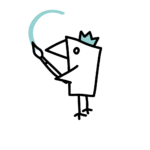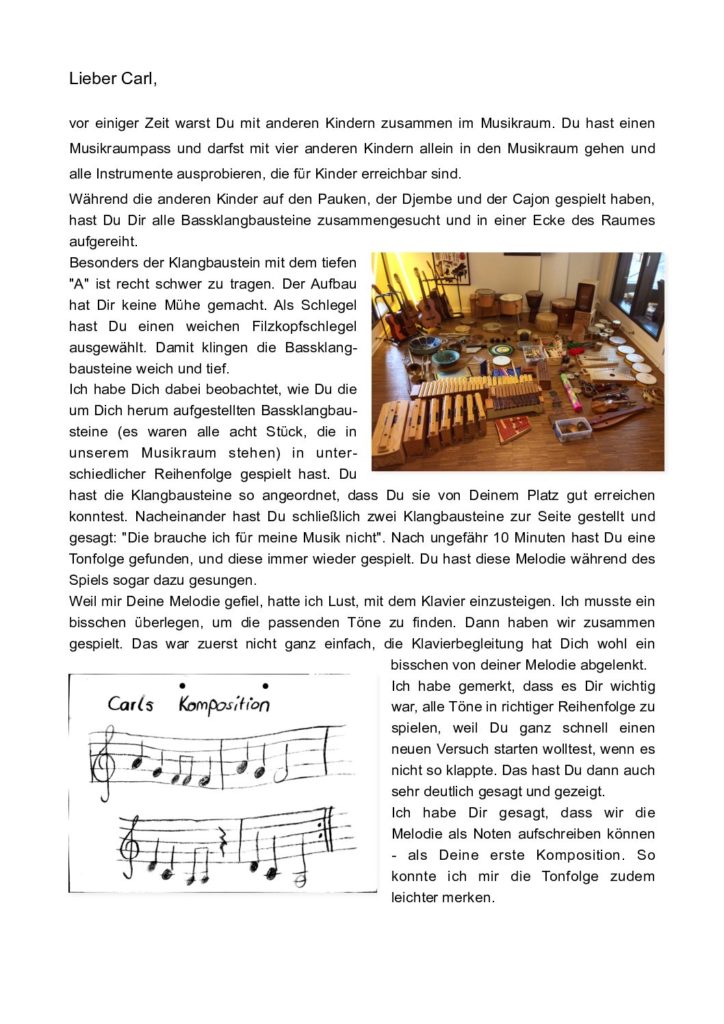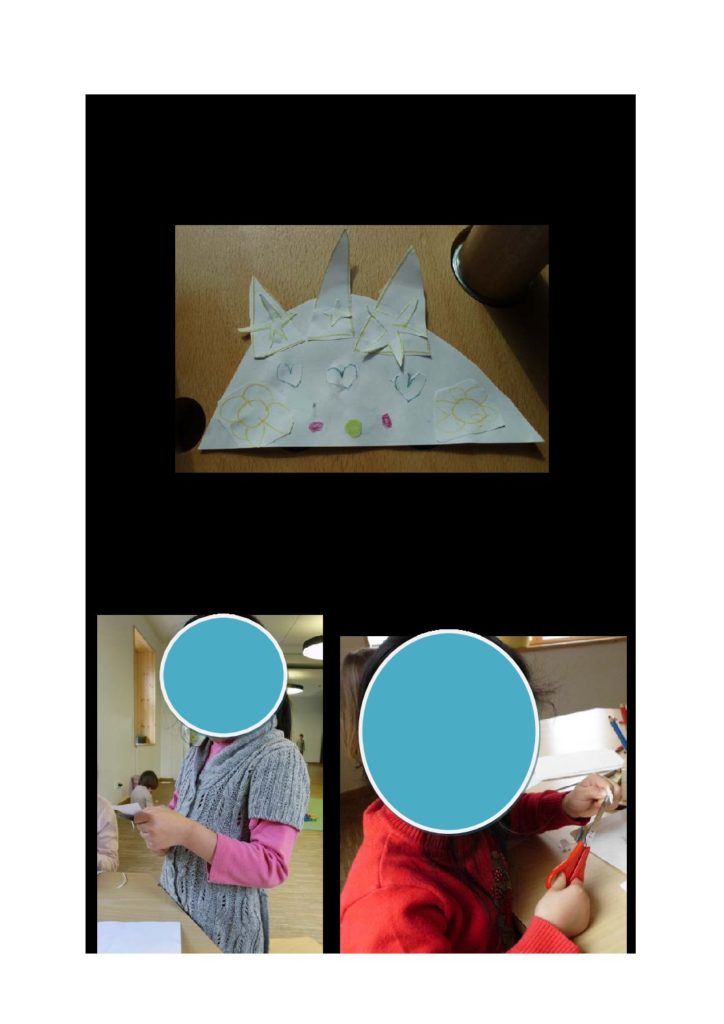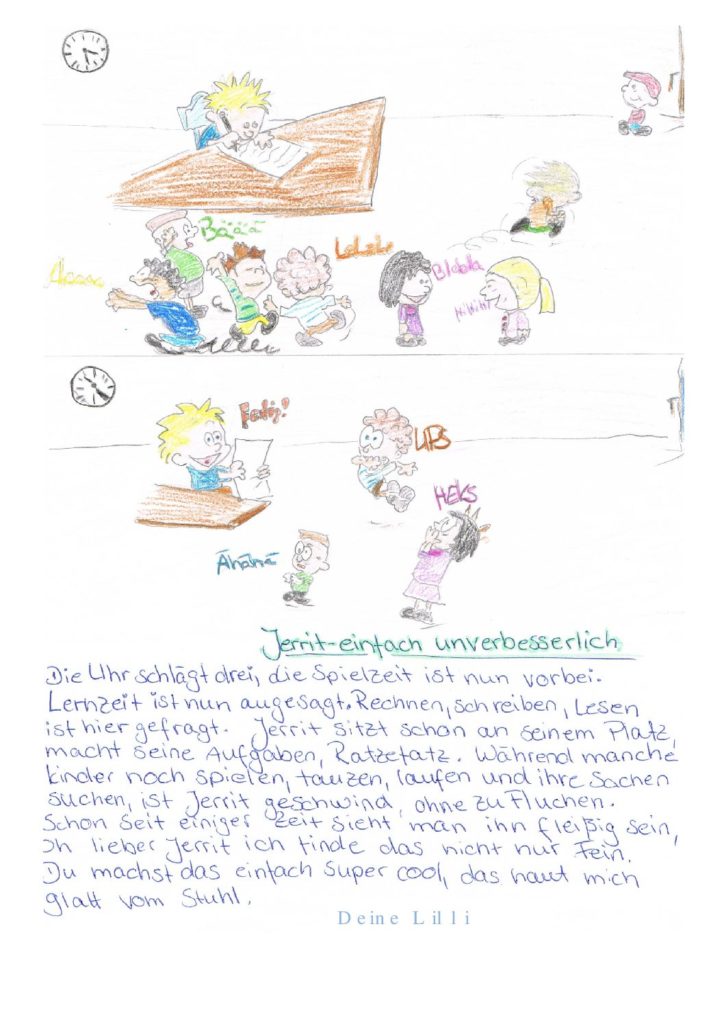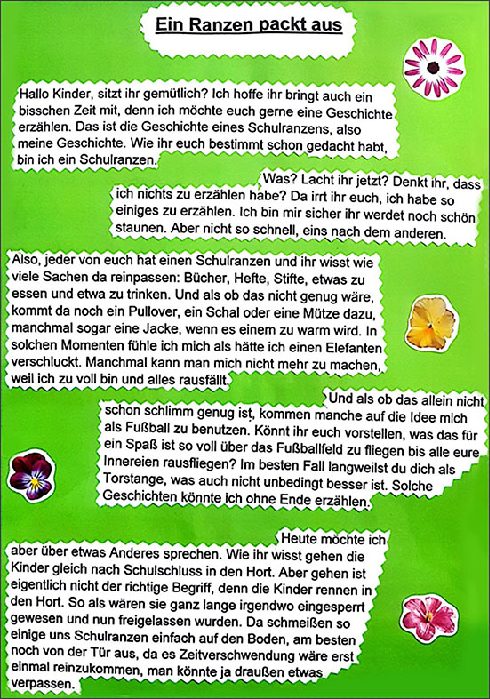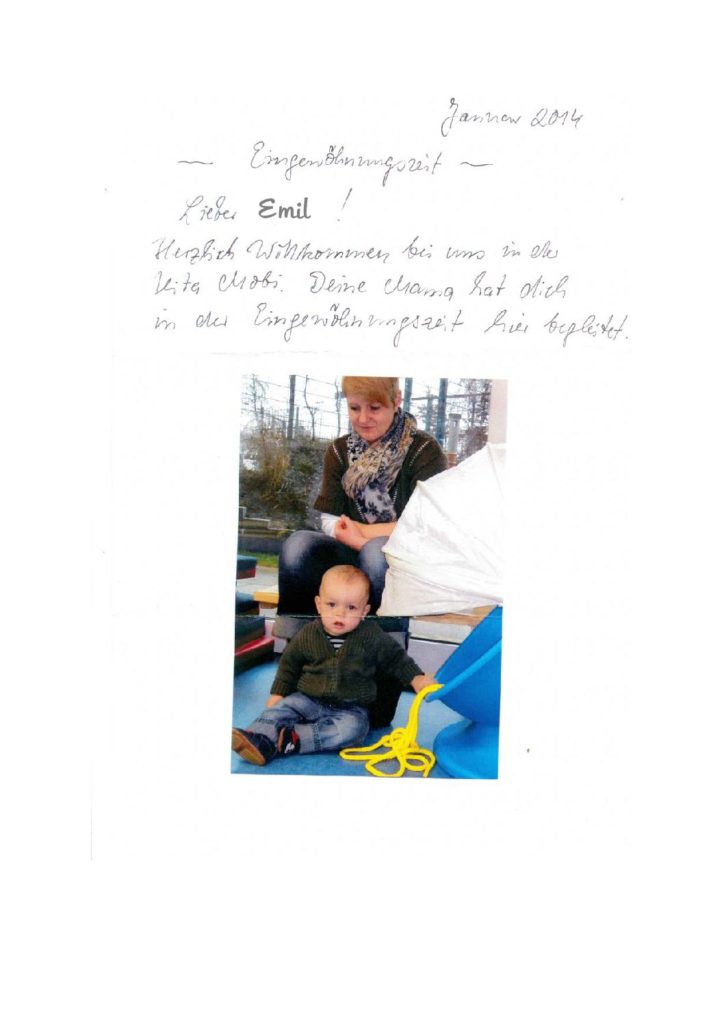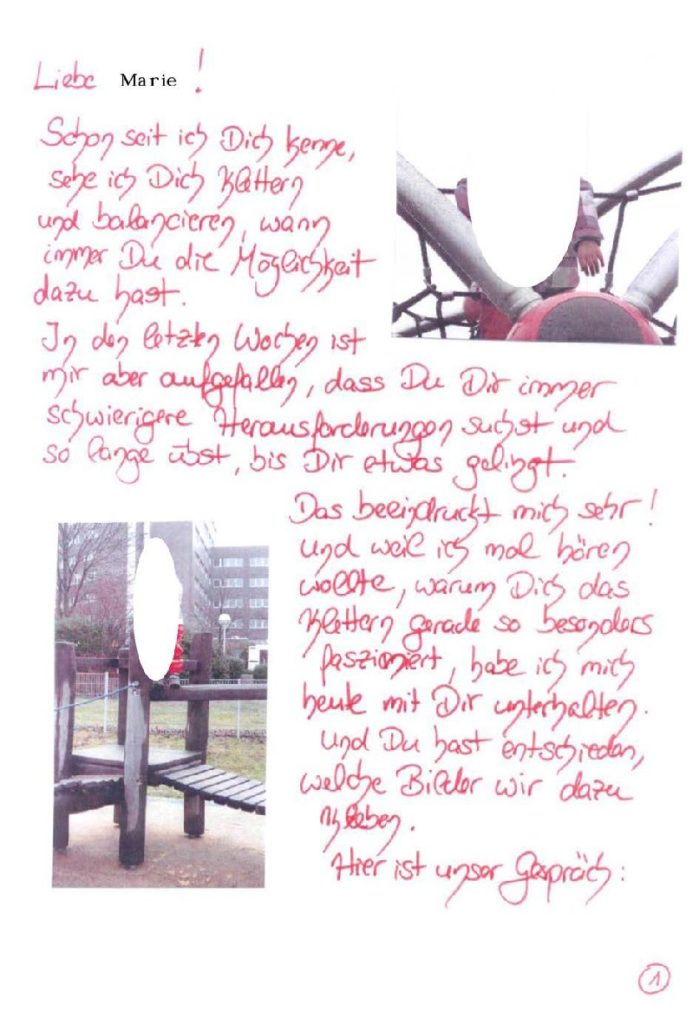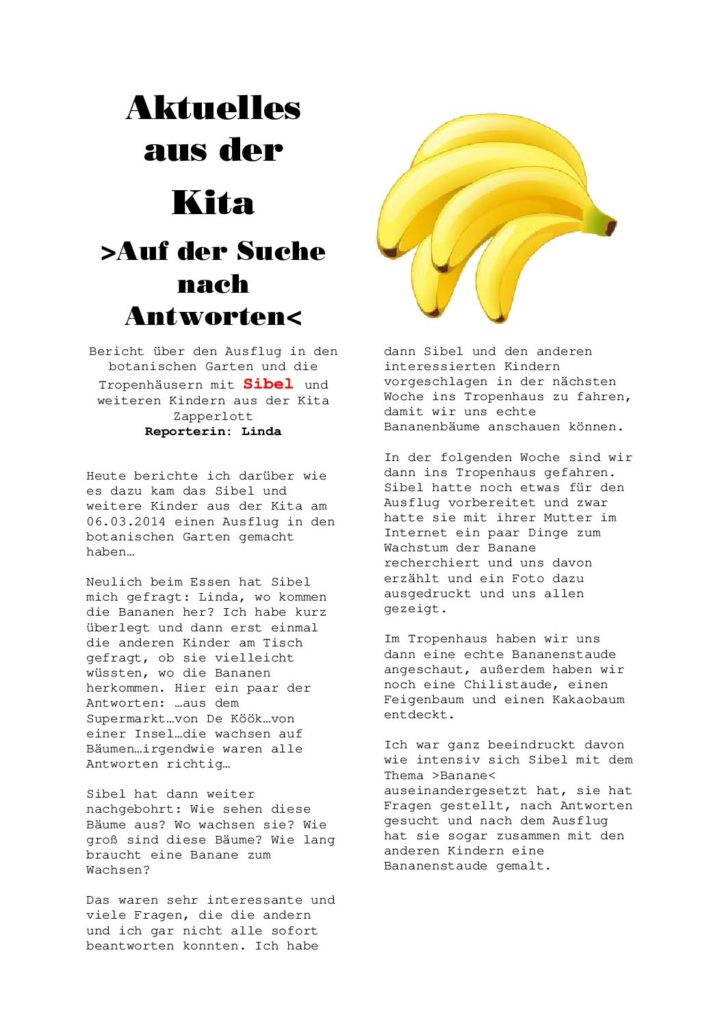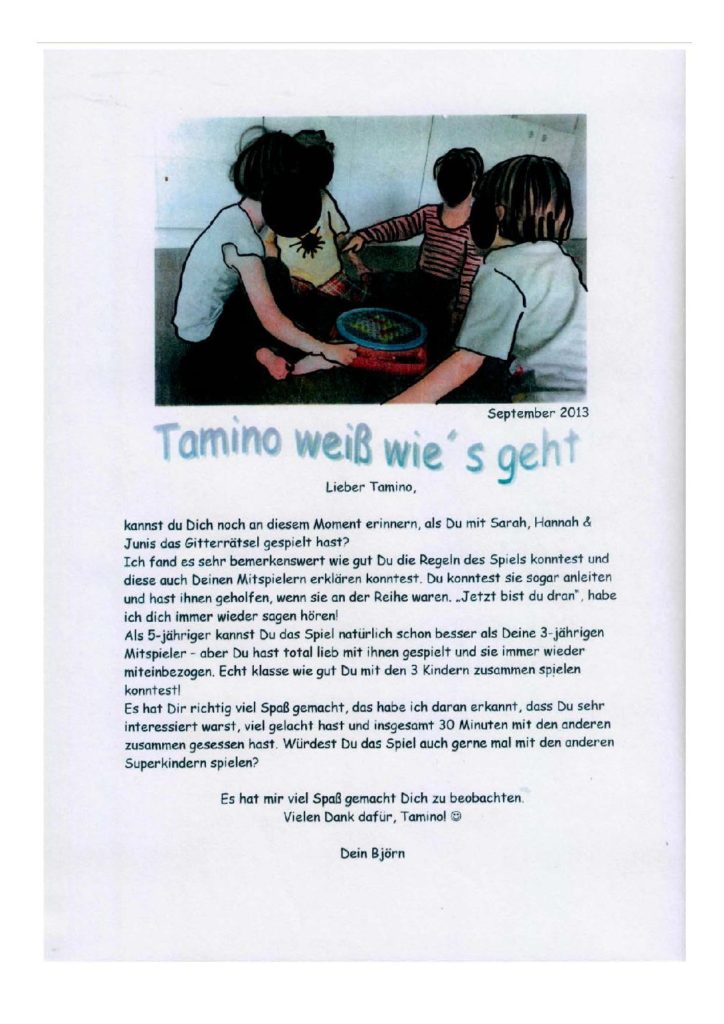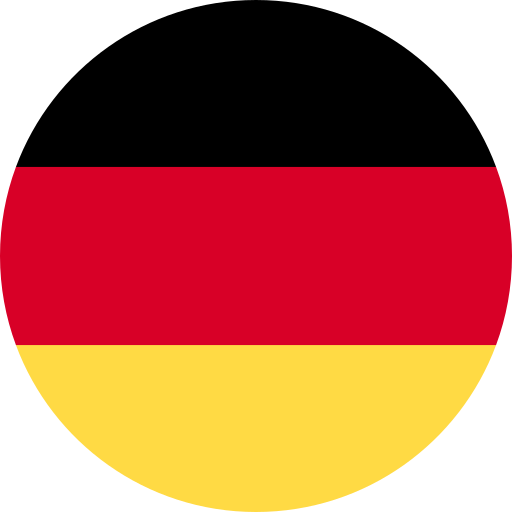LANGUAGE & EDUCATION
Participation
For us, participation in the day-care centre or at school means involving children in daily life in a way that matches their respective ages. It means involving them in the drawing up of activities and letting them have a say in decisions that affect them, their group or the facility as a whole.
We initially look at children’s everyday practical decisions – where, what, with whom they want to play. Which materials they want to use. What their food choices are. Who gets to change their nappy.
The partial opening of the groups as well as the set-up of areas according to themes support the children in the process of pursuing their interests. As they grow older, the forms of participation change. Children’s conferences and panel structures provide the setting for children’s concerns to be talked about, and solutions to certain topics are sought to be found. The educational staff are in active dialogue with the children. In this role, the adults accompany the children in finding solutions.
Once the children have become familiar with the principles of co-determination, a certain momentum is reached and they increasingly want to be involved. The question about which playground the group goes to, which food is to be ordered for the following week or which project should be looked into next is discussed in the group and determined in a democratic process. Common tools for such elections are, for example, photos of rooms or materials. In the voting process the children’s votes are symbolised with little stones or sticky dots, and decisions are taken in a way that is clearly visible and relatable for everyone.
We work with various approaches in our day-care centres and at schools to achieve co-determination. The nurseries use different methods than the kindergarten groups. The pre-school groups are mostly so well-acquainted with the procedure that taking decisions together and taking responsibility for these is a matter of course.
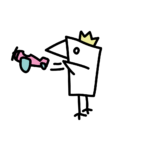
EDUCATIONAL & LEARNING STORIES
Information for parents
The learning stories make your children’s learning and strengths visible and support them in their development. You’ll find more detailed information in a PDF file that can be downloaded here.
Portfolio
An important part of the observation and documentation procedure of the educational and learning stories* is the portfolio work. Each child receives his or her own portfolio (folder) in the day-care centre and/or during afternoon care. It’s important that the child knows that it is his/her own portfolio and that he or she can decide him- or herself who may look at it and what goes inside. Part of the work with the portfolio also includes the parents bringing along a story from the holidays or creating About Me profiles with their children.
* The procedure was tested by the German Youth Institute (www.dji.de) in a pilot project at 25 kindergarten facilities; the observation and training material was published in 2007. Since then, it has become one of the most widely used documentation and observation procedures in Germany.
Aspects of the portfolio work
- Individual documentation on educational steps for each child
- The child’s everyday life in the facility, an insight into the family as well as interests, skills and aptitudes are illustratively documented
- The child and his/her parents are actively involved in the process of creating the portfolio
- Portfolios encourage children to document their own activities, promoting self-assessment and self-reflection
- Vision: transfer of the portfolio to the primary school is theoretically possible and generally desirable to support teachers in being aware of the children’s resources and skills right from the start
EXAMPLES FROM EVERYDAY LIFE
LANGUAGE SUPPORT
Whether German is their first or second language: all children in Finkenau’s facilities are offered many linguistic opportunities every day, they delve into a “language bath” (immersion). Books, conversations in the group, songs and rhymes spark curiosity and promote the willingness to express themselves in versatile and nuanced ways.
Day-care centre Plus / Language day-care centre: The Finkenau day-care centres Sonnenschein I, Sonnenschein II and Kinderhaus Furtweg are taking part in the federal government’s language support projects, which provide additional services for children with foreign-language parents. Further information on the federal government’s programme “Sprach-Kita: Weil Sprache der Schlüssel zur Welt ist” (which translates as “Language kindergarten: because language is the key to the world”) is available here.
BILINGUAL DAY-CARE CENTRES
Bilingualism is the objective for all of our day-care centres. Some of our day-care centres are already bilingual (English–German/Russian–German). We want to draw exclusively on pedagogical staff in this field as well in our work with the children. This means it takes longer to achieve this objective.
| Mucklas | |
| Ratz und Rübe | |
| Wurzelkinder |
EARLY INTERVENTION / INCLUSION
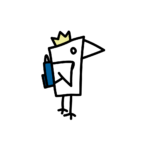
Children with early intervention needs according to Section 26 of the Non-profit Association for Childcare (gemeinnützige Gesellschaft für Kinderbetreuung mbH – KibeG)
The majority of our facilities offer early intervention places. In nurseries, this occurs in cooperation with early intervention centres. At kindergartens, our remedial education specialists provide support in liaison with external therapists. They come to the facilities to give support in certain areas (early intervention plan). Stiftung Kindergärten Finkenau has provided inclusive care for children with disabilities right from the start. We consider exclusion in separate institutions to be inappropriate. We ourselves as welfare organisation with our specialist staff have long been committed to living the idea of inclusion in our everyday educational work. The system of integration assistance tends to focus on the children in terms of their deficits and invariably requires us to bridge a gap in our thinking.
We have already been looking at the children’s resources intensively for several years. We follow the principle “Strengthen strengths to weaken weaknesses”. The UN guidelines of inclusion meanwhile also support our approach. Since 2012, the UN standards have also been included in the respective documents in Hamburg. A change of perspective is gradually taking place, which is something we have always striven for.
What does integration help mean for us?
- Assisting parents in the process of diagnostics / assessments / support plan talks
- Based on the findings and recommendations of the therapists, the children receive targeted help in small groups and are supported in the collective group
- Needs-based therapeutic services in the day-care centre (speech therapy, occupational therapy, physiotherapy, etc.)
- Remedial education offers
- Accompanying, precise observation of the child
- Precise documentation using the Authority of Labour, Social, Family and Integration’s interdisciplinary intervention and treatment plans as well as the educational and learning stories
- Regular exchange within the team, with parents and external therapists
Children who are fast in their development with special talents and children with intellectual giftedness
Children who are particularly interested in a certain subject (music, art, numbers, exercise or language) are often treated disparagingly in public education. They might disturb the normal routine and be dismissed as overachievers. They might seem to question the authority of adults with their “precociousness”. They might grate “on people’s nerves” with their questions or be perceived as a nuisance, never giving anyone a moment’s peace.
We want to look at what is fascinating and enriching about these children. We want to approach and foster them with this in mind. We experience the originality of their thoughts, their intensive research, their urge to act independently as an impulse for everyone. Giving them space for their own research projects and encouraging them in their intensive thinking and actions must be one of the objectives in our work with these children.
THE “BRIDGE YEAR” – THE YEAR BEFORE ENROLMENT
The transition into school is a big change for all children going to kindergarten. The Stiftung Kindergärten Finkenau takes part in the quality initiative Brückenjahr (literally translated as “Bridge Year”, meaning the year before enrolment) to prepare and provide professional guidance for the important transition from kindergarten to school.
In Hamburg, parents can decide whether their child continues to go to the kindergarten or goes to pre-school, where it already starts learning about letters, numbers, etc. The parents are faced with a major challenge that often leads to uncertainty: will my child be missing out if it stays at kindergarten? Could there be disadvantages for my child in comparison to others? …
10 good reasons for the Bridge Year at kindergarten
- A diverse range of learning opportunities – the facility’s entire educational staff incorporates the broad spectrum of educational areas here. Exercise-oriented offers continue to have high priority. The individual interests and talents of all children are nurtured.
- Language support – language support is a key objective; it can take place in special language support units (with internal or external language support staff) as well as in everyday language situations.
- Child-teacher ratio – compared to the pre-school class in schools, the ratio is usually better here. As a result, there is usually more leeway for excursions and explorations through the district. All of the facility’s staff members are available for projects with their specialist fields. In some cases, speech pathologists and other therapists come directly to the facility as well.
- Reconciliation of family and working life – we offer support service with early and late shifts from a single source with flexible care periods.
- Healthy meals / communal meals – we offer mostly organic food and wholefood products. The children share in the communal breakfast and lunch and are given drinks and fruit.
- Stimulatingly arranged indoor and outdoor spaces – our kindergartens are pedagogically created “spaces for children”.
- Learning integrated daily life – we follow the Hamburg educational recommendations for pre-school learning; we have the liberty to alternate structured forms of learning with playful, movement-oriented and above all self-determined forms of learning. In addition, our “Bridge Year” children benefit from all other activities in the kindergarten. They develop social skills that are crucial for successfully attending school later (speaking before a group, taking turns, waiting for their own turn, presenting their interests, resolving conflicts, experiencing disappointments, etc.).
- Learning in a familiar setting – the presence of trusted people as well as familiar surroundings support the children in embracing learning opportunities and strengthen them in their personal development.
- Change of status “I’m big now” – the children learn in mixed-age groups that they are now (and just here) the “big ones”; they are role models for the younger ones and take on responsibility (guardianships).
- Counselling for parents and development observation – before every new “Bridge Year”, the parents are invited to a parents’ evening. The children’s development is carefully documented and the development meetings take place based on standardised competence assessment sheets (Kompetenz-Einschätzbögen – KEKS) and by means of the educational and learning stories. All adults are thereby aware of the respective child’s resources, skills and aptitudes.
[taken from, summarised & complemented: Bausteine für das Kita-Brückenjahr, translated as “Building Blocks for the Kindergarten’s Bridge Year”]
Finkenau is committed to enabling children to have a good start in their first year at school. In addition to our principle that research and learning begins as soon as the children join our nurseries/kindergartens, we want to take into account the children’s particular step change in development in the last year before school. It is particularly important here to the let the children develop their own projects over a longer period of time and to carry out larger projects with others. This allows the children to become aware of themselves and their abilities. At other times, the educational staff will provide suggestions regarding topics or tasks, which serves to strengthen the children regarding situations they might encounter at school.
Bridge Year Fair (Brückenjahrmesse) 2019
Bridge Year Fair (Brückenjahrmesse) 2018
Bridge Year Fair (Brückenjahrmesse) 2017
